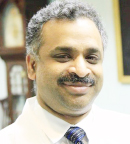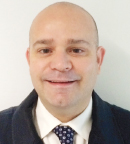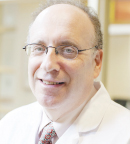
Ponnandai S. Somasundar, MD, MPH, FACS

Isacco Montroni, MD, PhD, FASCRS
Surgery is an integral part of treatment of elderly patients with solid malignancies. The times we are living in will be remembered by health-care providers for the significant “contradictions” in the medical and surgical care of elderly patients with cancer. On the one hand, it has been documented how chronologic age per se does not contraindicate surgical management at any time of life; on the other hand, the vast majority of senior patients with cancer are routinely undertreated as a consequence of unproven assumptions. This group of patients is likely to receive suboptimal treatment, either undertreatment or overtreatment.
The function of a surgical task force is to eliminate the myth that the elderly are not candidates for surgery. The role of the International Society of Geriatric Oncology (SIOG) surgical task force is mainly to establish evidence that may help clinicians become more aware and proactive about several issues.

Stuart M. Lichtman, MD
Understanding Cancer in the Elderly
THERE IS currently a poor understanding of cancer in the elderly. Solid tumors are detrimental at any age, as shown with colorectal, breast, and pancreatic cancers. Surgery is still the number one option to treat solid cancers, especially in senior adults. When appropriately chosen, it can be curative or a sound palliative procedure.
Prejudice about life expectancy usually prevents cancer specialists, whether it be medical oncologists, surgical oncologists, radiation oncologists, or geriatricians, from offering the best possible treatment.
GUEST EDITOR
Geriatrics for the Oncologist is guest edited by Stuart M. Lichtman, MD, and developed in collaboration with the International Society of Geriatric Oncology (SIOG). Dr. Lichtman is an Attending Physician at Memorial Sloan Kettering Cancer Center, Commack, New York, and Professor of Medicine at Weill Cornell Medical College, New York. He is also President of SIOG. For more information about geriatric oncology, visit www.siog.org and the ASCO Geriatric Oncology website.In the United States, a 75-year-old man in good health may have 18 more years in front of him and 10 more years at the age of 82. The presence of severe comorbidities shrinks life expectancy to 6 and 2 years, respectively, which is still a far longer period when compared with the average overall survival of patients with untreated cancer subtypes.
To Operate or Not to Operate
EVEN THOUGH there are significant educational efforts among surgeons, several members of the community remain hesitant to operate on the elderly simply because of their age. There are vast available data demonstrating how fit older individuals can have good quality-of-life outcomes after successfully undergoing complex invasive procedures. There should be a valiant effort on the part of society to educate and disseminate this information.
“Surgery is still the number one option to treat solid cancers, especially in senior adults. When appropriately chosen, it can be curative or a sound palliative procedure.”— Ponnandai S. Somasundar, MD, MPH, FACS, and Isacco Montroni, MD, PhD, FASCRS
Tweet this quote
The work of the SIOG surgical task force began about a decade ago, when the PACE study showed that assessment of frailty in elderly patients undergoing surgery accurately predicted operative mortality, morbidity, and costs.1 This was achieved by means of a non–cancer-specific tool (Comprehensive Geriatric Assessment). In 2014, another surgical task force effort, the PREOP study, showed that the complex and time-consuming Comprehensive Geriatric Assessment could be replaced by quick and surgeon-friendly tools such as the Timed Up and Go test and optimized nutrition plans for minimizing complications.2
More recently, the SIOG surgical task force together with the European Society of Surgical Oncology (ESSO) developed the GO SAFE project.3 The research was recently opened to serve the purpose of recording data about quality of life and the functional recovery of elderly patients undergoing major oncologic surgery. The ambitious endpoint of this international prospective registry is to take a real-time-picture of the ultimate outcomes achieved when delivering personalized care that fits vulnerable and frail patients with cancer.
The role of the SIOG surgical task force is precisely to promote an individualized surgical standard. We realize that personalized treatment does not focus on targeting molecular biomarkers but on making the needs of real-life patients the ultimate goal of our care.
“Groups of motivated surgeons, with a common goal focus on organ-specific malignancies, are open to the challenges that older adults with cancer face.”— Ponnandai S. Somasundar, MD, MPH, FACS, and Isacco Montroni, MD, PhD, FASCRS
Tweet this quote
Preparing for the Future
THE SIOG surgical task force is preparing for the future by implementing a network of clinicians, proficiently developed during the process of the PACE, the PREOP, and the GO SAFE studies. These groups of motivated surgeons, with a common goal focus on organ-specific malignancies, are open to the challenges that older adults with cancer face.
Members of this task force are ambassadors not only in the oncologic field in general but in the organ-specific scientific societies. Their role is to promote a more rational and personalized treatment of solid cancers in the elderly by collaborating on scientific sessions, guidelines, and research studies with the main scientific societies (ie, ESSO, American Society of Colon and Rectal Surgeons, European Society of Coloproctology, and SIOG). By doing so, they may function as vectors for the knowledge developed by the experience in the SIOG and in other scientific groups.
WHAT IS THE GO SAFE PROJECT?
- Featuring an international high-quality registry, the GO SAFE project is a research study evaluating the postoperative functional outcomes and quality of life after cancer surgery in geriatric patients.
- It is promoted by the European Society of Surgical Oncology and the surgical task force of the International Society of Geriatric Oncology.
- The first study patient was enrolled in February 2017.
- For more information about GO SAFE, visit cc.ubsc@irst.emr.it.
Further research projects by the SIOG surgical task force, following the GO SAFE project, will focus on fields that require immediate attention, specifically cancer surgery prehabilitation, biologic age predictors, and cancer biology in the elderly. ■
Dr. Somasundar is Associate Chief, Division of Surgical Oncology; Director of Geriatric Oncology Program; Associate Professor of Surgery, Department of Surgery, Roger Williams Medical Center, Boston University. Dr. Montroni is a colorectal and general surgeon, Ospedale per gli Infermi, Faenza, Italy.
DISCLOSURE: Dr. Somasundar reported no conflicts of interest. Dr. Montroni has received honoraria from, is on the speakers bureau of, and has received travel/accommodations/expenses from Olympus SE & Co.
REFERENCES
1. Audisio RA, Pope D, Ramesh HS; PACE participants: Shall we operate? Preoperative assessment in elderly cancer patients (PACE) can help. A SIOG surgical task force prospective study. Crit Rev Oncol Hematol 65:156-163, 2008.
2. Huisman MG, van Leeuwen BL, Ugolini G, et al: “Timed Up & Go”: A screening tool for predicting 30-day morbidity in onco-geriatric surgical patients? A multicenter cohort study. PLoS One 9:e0086863, 2014.
3. European Society of Surgical Oncology: Go Safe Project: Better understanding outcomes in elderly patients. Available at https://www.essoweb.org/research/gosafe-project/. Accessed December 20, 2018.

